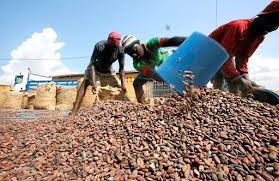APA-Abidjan (Côte d’Ivoire) – The price of this commodity on the world market could still be volatile in the intervening months.
On the London market in early April 2024, cocoa was trading at 6,300 CFA francs per kg, an all-time record. On the strength of this trend, the Ivorian government set the price of cocoa at 1,500 CFA francs per kilo at the opening of the intermediate trade, an increase of 50 percent.
Côte d’Ivoire, the world’s leading cocoa producer, uses the stabilised system. The daily rise in world prices is not passed on immediately, but benefits producers with a time lag.
Shortly before the start of the intermediate campaign on 2 April 2024, opposition parties called for an increase in the price per kg of cocoa. The ‘Parti Democratique de Côte d’Ivoire’ (PDCI), chaired by
Tidjane Thiam, suggested a price of 2,500 CFA francs per kg.
With the current rainy season, the quality of cocoa is declining. On the London Stock Exchange, prices have been falling for nearly a week, with a tonne sold at 5.98 million CFA francs on 1 May 2024, the lowest level for a month.
On the New York market, cocoa futures fell by nearly 581,000 CFA francs ($950) between 30 April and 1 May 2024, to 5.61 million CFA francs a tonne, the lowest level since 22 March 2024.
Cocoa prices had soared spectacularly in recent months, reaching US$10,000 per tonne, or 6,110 CFA francs per kg. In recent days, prices have fallen drastically, by an average of 27 percent since 30 April 2024.
“When cocoa prices rose significantly, Ivorian opponents took advantage of the upturn due to the vagaries of the weather to find limits to the government’s reforms,” said Bernard Kokora, Deputy
National Secretary of the ruling RHDP in North America.
For Mr. Nzi Bernard Kokora, the Ivorian opposition should appreciate the stabilisation system, which enables farmers to be guaranteed a field price despite fluctuations on the world market, praising the
farsightedness of President Alassane Ouattara.
Since the creation of the ‘Conseil du Cafe-Cacao,’ a regulatory body, in December 2011, Côte d’Ivoire has opted to grant at least 60 percent of the CIF price of cocoa to producers, by operating a stabilised
system based on the advance sale of a large part of the harvest on future markets.
Ivorian cocoa accounts for 45 percent of world supply, with over two million tonnes of beans produced, and contributes 14 percent to national GDP.
Global warming has dried out some orchards, causing national production to fall by 23 percent.
AP/fss/as/APA


